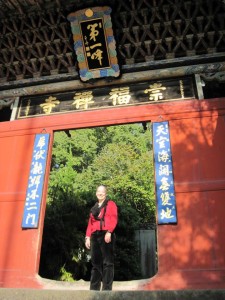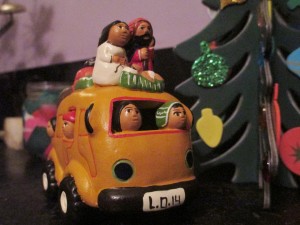Japan is a particular place, unique unto itself and settled into that particularity. When I am there, I feel completely at home and completely foreign. There are people going about their daily lives, following the predictable patterns that smooth the tasks of everyday living. Yet there are also subtle differences that unsettle a visitor such as myself when I disrupt these easy, orderly patterns.
Just over a year ago, I was fortunate to have work bring me back to this country that alternately fascinates and perplexes me. For eight days in the cold of February, I traveled. I spent the time mostly on my own — Tokyo to Fukuoka to Nagasaki — navigating the obvious that did not seem obvious to me at all, at first.
I did things like standing alone on a cold and windy train platform wondering “Where are the other passengers?” and then realizing that they had stayed inside, not passing through the gates until a moment before the train would arrive. Because, of course, this was Japan. The train would arrive precisely when scheduled. I entered the bus terminal by the wrong door and fumbled about for the tray and tongs so I could choose my items at the bakery. Every day I made mistakes.
However, I recall most clearly the kindnesses of those who nudged me into success.
The gesture of allowing me to go ahead in line that was also guidance about which line I should be in. The hotel staff member who made hot water for me since the instant hot water machines were obviously beyond my experience and thus ability. (He explained that he wanted to be sure the temperature was just right for the specific tea I had selected, silent on the reality that I had not been able to procure any water for myself at all.) The sushi chef who realized I had not ordered what I wanted and gently recommended that perhaps I would be happier with the alternative option offered.
Slowly I relaxed into the flow of the crowds around me, trusting instinct rather than ability to read directions or make logical sense of behaviors I observed. Eventually I found the patterns that guide those who are able to expect and predict rather than bumble and trip. Through this becoming, I reflected on the paradox that, the more foreign my surroundings, the more familiar I become with myself – that self that is always within me but is not always present to me.
Becoming so dependent on others as I did is not easy for someone as driven and self-sufficient as I. My first tendency is to resist – to insist that I can figure it out on my own. To declare that being alone does not mean I am incomplete or incompetent. I have come to realize, however, that if I can quiet that voice; I can hear another. It too is mine but it is the voice that reflects rather than analyzes, appreciates rather than judges, and welcomes the generosity of others — accepting the community that makes me more than I can be on my own. More fully myself. More familiar. More whole.
On my final day walking from shrine to shrine and temple to temple in Nagasaki, one of the vendors insisted that she take my picture with my camera “so that you will always remember this place.” She meant because of the signs below and between which I was standing, tall signs identifying Sofukuji Temple in golden Japanese script. She did not know that she was capturing for me a moment in time to which I had journeyed – to that inner place in which I re-find myself.
* * * * *
 “An Inner Place” was written by Lisa Janicke Hinchliffe. Lisa is a librarian and is many times published, but always scholarly, professional pieces. It is a new venture to write in this genre, and she will have to think about whether she will do it again.
“An Inner Place” was written by Lisa Janicke Hinchliffe. Lisa is a librarian and is many times published, but always scholarly, professional pieces. It is a new venture to write in this genre, and she will have to think about whether she will do it again.
Lisa lives in Urbana, Illinois. When not at home, she lives easily out of a carry-on bag for up to weeks at time. Lisa can be found on Twitter at@lisalibrarian.
